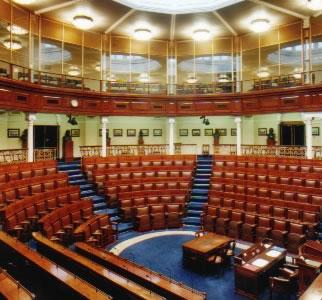Reform the Dáil to fix democracy dysfunction

Government of the people by the people requires radical change in our self-serving parliamentary system, writes Vincent Browne.
The stunts over the abolition of the Seanad are a reminder that however desperate the nation's condition may be, our politicians can be relied upon to do everything they can to make matters worse.
Not that abolishing the Seanad would make much difference one way or another; rather, the political antics we have witnessed confirm that our infantile political culture remains intact. There is no gimmick so puerile not to be deployed by Fine Gael and Labour to gain advantage over one another, nor by Fianna Fáil to survive.
The Seanad as it is constituted is an irrelevance. Of far greater significance, however, is the irrelevance of the Dáil, the primary institution of our democracy. Not one of the political parties is proposing to do anything about that irrelevancy. Yes, they talk about Dáil reform but the reforms they talk about are mainly about the optics.
The point of the Dáil is to hold government responsible to the representatives of the people but the reality is that, via the whip system, the Dáil is controlled by the government of the day, which makes accountability meaningless. It also makes largely meaningless the role of the Dáil as the legislative institution, for almost all legislation is originated by the government, which then accedes to amendment proposals solely at the discretion of the minister concerned.
The failure of that accountability is responsible in part for the financial and economic crisis that has befallen the country. The Dáil was incapable of holding the government to account for inflating the property bubble, for ravishing the tax base, for running pro-cyclical budgetary strategies (ie boosting an already booming economy) and for failing to notice that the banks were about to implode. True, the opposition parties also had little interest in these phenomena during the boom times but the institutional irrelevance of the Dáil to such issues facilitated that lack of interest.
Without radical change of our parliamentary institutions, the compliance of the Dáil to the dictates of the government of the day will frustrate accountability and perpetuate the present dysfunctional system.
I can think of only two possible remedies. One is to make it an offence under the Constitution (thereby giving the arrangement some permanency) for anybody to interfere with the conscientious vote of a member of the Dáil on any measure – thereby getting rid of the whip system. Or, alternatively, introducing an arrangement instituted in the Danish parliament, called "decisive minorities", whereby a minority of deputies (say a third), either in the Dáil itself or in a Dáil committee, can force an inquiry into any matter and that all papers and witnesses can be compelled upon the say-so of that minority.
There is a graver problem with our democracy, however, and it is the shallowness of our democracy.
The idea that "government of the people, by the people, for the people" is represented by the electorate's opportunity to fire the government of the day every four or five years, and thereby put in office the alternative government, is nonsense. The rhetoric is, of course, that it is government for the people, but government of the people? Surely, at best, government by representatives of the people is government subcontracted by the people. And as for "by the people", forget it. A four to five-year veto over the continuation in office of the government of the day is a four to five-year veto by the people, it is not "government by the people".
I have two proposals designed to bring people much more into the democratic process.
The first is that a constitutional amendment be inaugurated which provides for a petition, signed by, say, 200,000 citizens, demanding that any measure then before the Dáil be put to referendum by the people and that the outcome of the referendum be binding. This would go some way towards providing "government by the people". A further amendment would ensure that fundamental rights in the Constitution could be altered only with the approval of a majority of the electorate, not just of those voting.
The other proposal has to do with term limits on Dáil membership, the point here being to ensure that far more people partake in the parliamentary process than do at present. I suggest that nobody who has served two terms in the Dáil be permitted to run again. I also propose that the Dáil term be reduced to three years, so that the longest time anybody would serve in the Dáil would be six years.
Yes, there is the disadvantage that people with political experience would be barred from political office and this would mean acquired expertise would be lost. However, the advantage of involving far more people in the parliamentary process over generations, along with the direct democracy initiative or referenda, would mean far more people were versed in politics and that politics by the people would be far more meaningful.
Is there the slightest chance that any of these measures will be adopted? None at all. The atrophy of our existing system will see to that.
